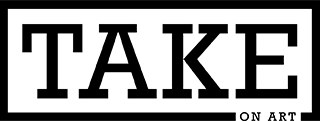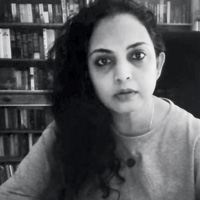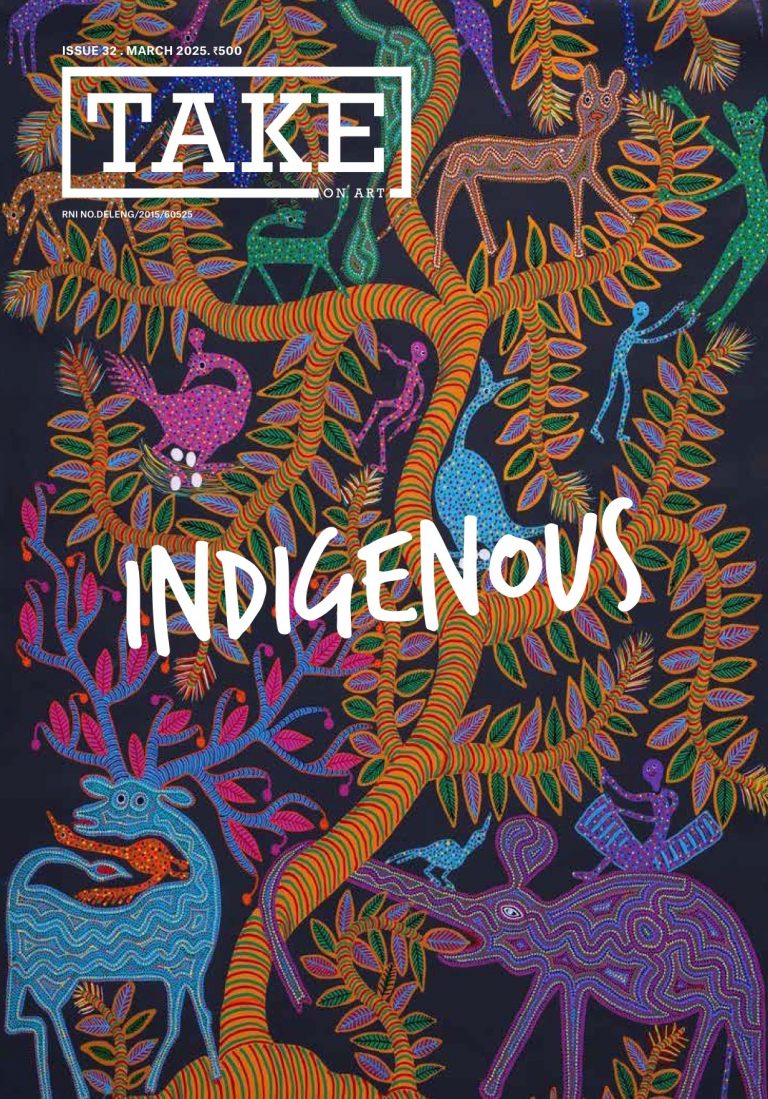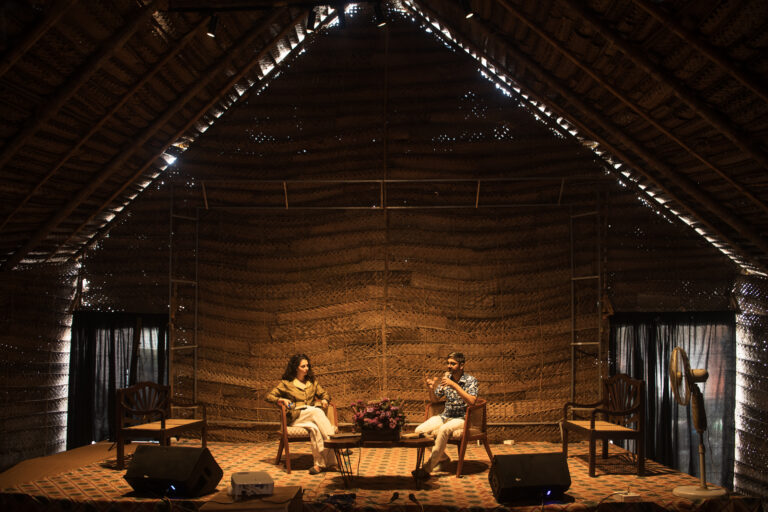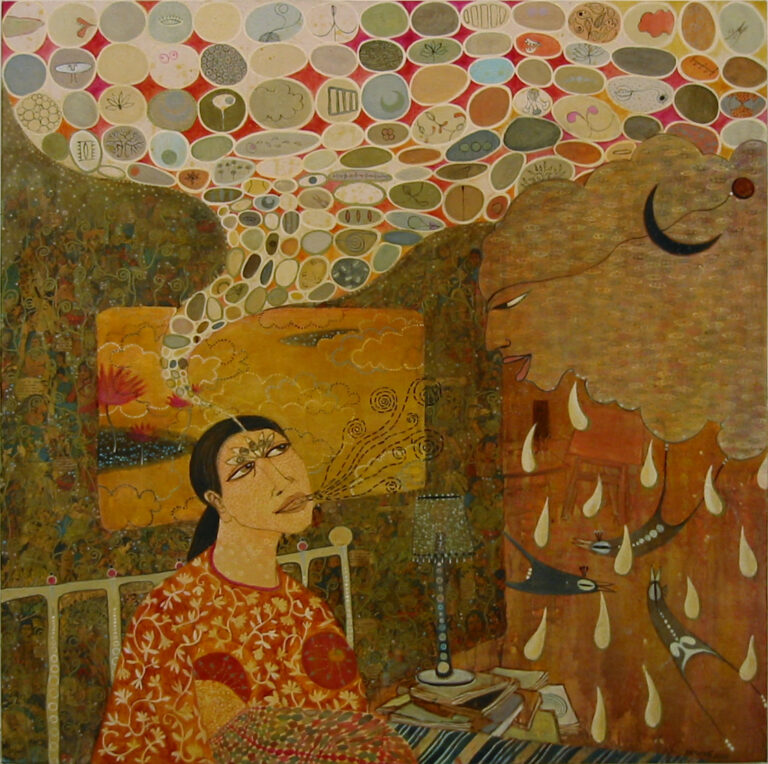It’s been four years since Reena Saini Kallat had a solo show in Mumbai. With Blind Spots at the Chemould Prescott Road gallery, the hiatus ends. This exhibition could easily have been called A Border Tale, because it deals with the divisions created and engendered by man to separate people by faith, by ideology and by colour. It takes on a special significance in today’s global environment of bias, mistrust and discrimination. And Kallat does it quietly, with restraint and elegance, under rather than over-telling the stories she shares. As she says in an introduction, “I’m exploring the space… where we seem to have lost sight of some of our core values and aspirations common to both sides… My attempt is for us to seek the many commonalities amidst difference or the many bonds beyond the borders.”
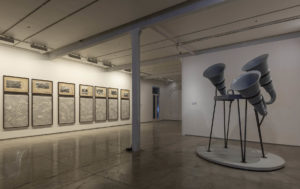
This is not a new direction for the artist, but a route she has been travelling for about fifteen years now. Her work examines not just the actual lines that separate nations and their people, she also focusses on the psychological and social barriers that divide. Kallat combines drawing, photography, sculpture, video and emotion to depict a global phenomenon that has often been tragic in consequence, with human beings battling each other for nothing more than a perceived lack of similarity and thus belonging.
Six drawings are connected by facets of history that are brutal in their honesty. Leaking Lines (2018-19) is a set of six diptychs that speaks of conflict and its scars. International borders with neighbours are fractured by tensions between them, contrasting the charcoal lines of reality overlaid with undulating strands of electric wires delineating shades of pain. There is a silence that speaks loudly of suffering and a desire to find a better place. From a perspective of physical distance, this collation looks like a contour map from an atlas that has been updated over time. From closer by, it gets fuzzier, more diffuse, like Rorschach blurs that have whatever meaning the viewer wants to find in them.
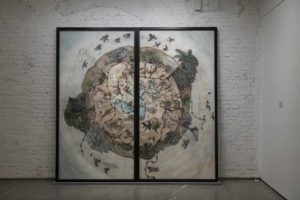
In contrast to the quiet of Leaking Lines is the literally noisy Chorus (2018-19), an installation that harks back to a time in history that was dark and, in many ways, changed humanity. Modelled on acoustic devices used to track enemy aircraft using sound – this was a while before the radar was invented and implemented – there is a charming twist on the original. Kallat uses birdsong instead of engine noises, incorporating native birdcalls from bordering nations that have been separated by not just political divisions, but by differences in thought. She used the hoopoe (Israel), peacock (India), sunbird (Palestine), doyel (Bangladesh) crested caracara (Mexico) and eagle (USA) singing together to show off how birds have no fixed boundaries except for their individual habitats that span man-made delineations. Perhaps this would be better set in a more isolated space, since traffic noises, footsteps, ringing telephones and voices interrupt the experience.
That same seamless melding of lives comes to the fore esoterically in Cleft (2017), a panoply of animals great and small, familiar and unknown, weird and ordinary. These are strange hybrids that cross the horizons of species and the expected, purportedly aiming to unite by merging forms. A kind of Noah’s ark of strange creatures great and small—a panda-tiger, stag-lion, snake-crocodile, evoking Indian myths describing the origin of the universe. Can things be reset? Will humankind be able to create a new and better tomorrow? Relook at the world as it is now, throw everything into a blender and let it spit out whatever results… who knows! This one reflects a long-term concern for the world as it is becoming that Kallat has shown in so many of her works. The colours are light and happy, the mood that ensues after a little thought is anything but, especially in today’s context of climate degradation, violence and the human condition.
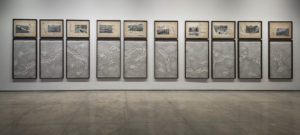
There is more to humanity and community than sharing blood – or indeed, shedding blood. There is also change that comes with division…or doesn’t. Shifting Ecotone-2 (The Teesta River, 2019) harks back to the concept of borders that move with time and the local socio-political dynamic, with landscapes that change as peoples do. The water bodies that often form convenient borders between nations also shift course, almost like a jigsaw puzzle. And while human residents may perforce have to obey the rules made by man, the flora and fauna of the region have different plans, varying routes that they travel to find food, a home or a family. Biodiversity is the focus here, with a lesson for communities that stay alienated or perhaps learn to co-exist.
And tying the whole thought behind the collection together is the eponymous piece that is seemingly a set of eye charts, the Snellen tests used to measure vision. These are usually used to check for nearsightedness, myopic views of the world, which is entirely appropriate in the current context. Kallat used the preambles of the constitutions of seven pairs of nations that are in conflict with each other to depict the lack of sight of those who would wage war rather than live in harmony. The promises made to the people of the nations form pyramids with disjointed letters and series of dots that resemble Braille notations but really signify nothing except blindness to values such as democracy, freedom, justice, equality, truth and ethics. These are true-to-life Blind Spots (2018-19) that blare loud and clear in today’s obscurantism and blurred reality of uncertain futures and messy political leadership.
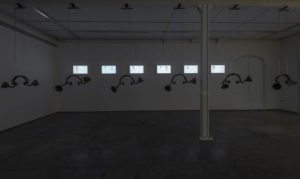
In view of the world as it is now, Kallat’s show makes perfect sense. It could become just a commentary on life’s downs as contrasted to a more idealistic possibility, or it could act as a wake-up call that joins so many others ringing clarion across the world. Whatever it may be for whoever sees it, it has an important message to convey, a message that everyone needs to listen to…
Reena Saini Kallat : Blind Spots/ Scotoma, Chemould Prescott Road, Mumbai, 30 November 2019–28 December 2019
All images are courtesy of Chemould Prescott Road.



